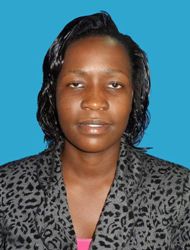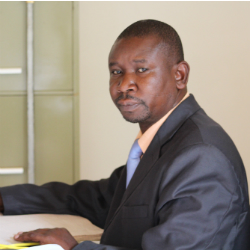DIRECTORATE OF LEGISLATIVE PROCEDURE AND COMMITTEE SERVICES
SHEILLAH OBARE - DIRECTOR
The Directorate is headed by Director Legislative Procedures and Committee Services and assisted by the Deputy Director Legislative Procedures and Committee Services
The directorate consists of five departments namely;
1. Legislative Procedures and Committee Services
2. Hansard Department
3. Serjeant-At-Arms Department
4. ICT Department
Legislative Procedures and committee services division
It is divided into two namely;
i. Table and Journals Division
ii. Committee Services Division
Table and Journals
- This is the office that supports ‘Table’ of the Assembly.
- The table office is the nerve centre to the County Assembly.
- All documentation/Journals relating to proceedings of the House are kept in the Table Office.
Roles of the Table and Journals Division
The roles of the Table and Journal Office include among others;
- Clerks at the Table Office advise Members on how to word Motions so that they conform to the rules of the House.
- The Table Office staff also draft and edit notices of motions, petitions and Statements filed by Members.
- Table Office staff advise Members on procedural matters such as whether motions, Statements or petitions are in order
- Administer all business relating to legislation by processing Bills, preparing legislative documents such as schedule of amendments
- Tracking of Bills, Statements, Motions and Petitions using trackers
- The Table Office produces the Assembly’s Order Paper
- Preparation and custody of list of speakers for all debates
- Responds to all inquiries relating to work of the Assembly and acts as an information hub for members of the County Assembly, staff as well as general public
- Preparation of Votes and Proceedings
- Serializing, custody and tracking of Statements, Petitions, Motions and Bills
Committee Services Division
The Committee Services Division offers administrative services to all Committees of the County
Assembly.
Roles of the Committee Services Division
- Offering administrative services to the Division
- Formulation of committee work plans and budgets
- Preparation of committee schedule
- Conducting research on aspects of the committees
- Offering of procedural advice to committee Chairpersons and members in regard to legislative practices and procedures as to the conduct of committee business
- Facilitation and coordination of committee meetings, seminars and conferences including booking and preparation of meeting venues
- Keeping custody of records of committees including minutes of meetings, reports and correspondences
- Facilitation of public participation and involvement in the activities of the committee
MEMBERS OF LEGISLATIVE PROCEDURES AND COMMITTEE SERVICES |
|||
|
|
|||
|
MILLICENT MISATI Ag. DIRECTOR |
|||
|
|
|||
|
PROCEDURES AND COMMITTEE SERVICES |
|||
|
Peninah Kerama Senior Clerk Assistant I |
Wilfred Onkoba Senior Clerk Assistant I |
Hassan Mokaya Senior Clerk Assistant I |
Senior Clerk Assistant II |
|
|
|||
|
Linet Nyanga'u Senior Clerk Assistant I |
Kevin Riro Clerk Assistant I |
Felis Osoro Clerk Assistant I |
Patience Orina Clerk Assistant II |
|
|
|||
|
Gladys Sorobi Clerk Assistant III |
|
Stella Nyamete Clerk Assistant III |
Mary Kerubo Clerk Assistant |
|
|
|||
HANSARD DEPARTMENT
Introduction
The Hansard Department at the County Assembly of Nyamira was established in April, 2013. The core function of the Department is the production of accurate, timely and efficient reports of the proceedings of the County Assembly plenary and its committees. The Hansard mandate is provided for in the County Assembly of Nyamira Standing Order Number 228(1).
In the department therefore, we produce verbatim reports of the Assembly plenary sittings and record committee hearings.
Mandate of the Department
The Hansard report serves as the main reference publication for members of the assembly, county government departments and the public at large.
The courts of law refer to the Hansard when they are interpreting the Acts of the Assembly.
Newspapers refer to the Hansard to make sure that they do not misreport what was said in the House.
The Hansard report has become an important publication whenever there are critical issues in the House.
The House may not proceed with the business of the House without the Hansard services.
Other roles include:
- The Hansard department maintains up-to-date personal copies of all Hansard and other reporting service manuals.
- Performs any other duties associated with the reporting of the House.
- Provides editing and proofreading services.
Establishment
|
|
|||
|
Miss Lydia M. Ondieki Assistant Hansard Editor |
|||
|
|
|||
|
|
|
|
Mr. Evans M.Osinde Hansard Reporter 3 |
|
|
|||
|
|
|||
Achievements
- The assembly has never been adjourned due to failure or lack of the Hansard system.
- Timely production of Hansard reports whenever called upon.
- Production of standard reports.
- Establishment of a widely accepted house style of reports.
- Recording of about 75 percent of Assembly committees.
- Highly trainable staff members with the ability to operate and use complex Hansard production equipment.
- Embracing team spirit for smooth operations.
Challenges
- Sitting for long and usage of headphones has affected health of some officers. It is recommended that a person only handles a ten-minute transcription. Currently we are forced to handle up to 60 minutes of transcription a day which has in turn affected our health. This is because the department is understaffed.
- Recording of County Assembly Committees which is a preserve of the department has been facing some hiccups because we do not record all committees.
- On tools of work, we are seven, but we only have five computers. We therefore, work in shifts. Again, out of these computers, it is only four that are connected to an Uninterruptible Power Supply (UPS). With the intermittent electric power supply in the area and owing to our strict deadlines, we are left with no option, but to work late whenever there is electric power in order to beat deadlines.
Conclusion
Despite the challenges, we acknowledge efforts being made by the Assembly to enable the department fulfill its mandate effectively and efficiently. For instance, the Hansard audio and recording system is almost fully installed and it is in use.
By embracing team work and total co-operation in the department as well as establishing linkages with other departments has seen an exemplary performance against all odds. We hope we will continue working with the same spirit to move the Hansard Department and the County Assembly of Nyamira to greater heights in development.
ICT DEPARTMENT
The ICT department is established to provide an innovative means of delivering services to members in the County assembly.
Objectives
The Key objectives of ICT department include;
- To ensure provision and maintenance of infrastructural facilities necessary for ICT development
- To promote and support the systematic, relevant and sustainable development of ICTs
- To establish structures for effective implementation of ICTs strategies
- To ensure equitable access to benefits offered by ICTs across all departments
- Reduce costs and improve returns for ICT
- Improve Public Satisfaction in the ICT Service delivery
- Deliver the systems and technical architecture for a changing County Assembly of Nyamira
- Protect and improve the use of County Assembly of Nyamira information
- Improve outcomes in County Assembly of Nyamira by harnessing ICT skills & innovation
Core Values
Cores values for the ICT department are summarised in the following acronym “ARISE”
A - Accountability
R - Reliable, result oriented
I - Innovation, integrity
S - Sense of urgency
E - Excellency
MANDATE
Mandate of the ICT department in the County Assembly
- To develop ICT policy and ICT strategy
- To Automate core services
- To Maintain server functions
- To provide Data management services
- To design, develop and maintain the Website
- To provide technical support to the members of the county Assembly and staff
- To provide and maintain secure user-friendly information systems
- To distribute computer hardware, peripheral and computer consumables
- To provide hardware and software support which includes installation and servicing
- To provide software maintenance and troubleshooting,
- To solve user problems and assisting them whenever need arises
- To provide network administration
- To provide administration of emails, intranet, extranet and internet facilities
- To provide computer training for the staff and MCA’s
- The department has developed the ICT policy, Nyamira ICT Strategy for 2017-2022, and ICT Governance Framework in line with the existing government policies, legal and regulatory framework.
The ICT policy seeks to;
- Ensure provision of adequate and reliable information systems in the County Assembly of Nyamira
- Provide guidelines on the usage of ICT software, hardware and services in the County Assembly of Nyamira
- Ensure information security of County Assembly of Nyamira systems and data
- Promote efficient utilization of information systems within the County Assembly of Nyamira employees
- Ensure application of best practices and standards
- Promote spirit of awareness, co-operation, trust and consideration for others.
| MEMBERS OF THE ICT DEPARTMENT ARE : | |||
|
Ms. LINET MOKAYA Deputy Director, ICT |
|||
| PROCEDURES AND COMMITTEE SERVICES | |||
|
Stephene Egoha Principal ICT Officer |
Dan Nyamache ICT Officer |
Geofrey Obare ICT Officer |
Lamech Matoke ICT Officer |
|
|
|||
The County Assembly of Nyamira ICT Strategy for 2017-2022 reflects a number of changes in our approach to ICT strategic planning to meet this need. This strategy has to be focussed almost exclusively on the capabilities of the County Assembly of Nyamira, ICT delivery Service and on technological directions. In taking a more holistic view, this Strategy starts to recognise the pervasive nature and benefits of ICT as an asset to County Assembly of Nyamira -M.C.As, public and staff - and a growing need to extend ICT investments to real assembly benefits. It also recognises the need for the entire County Assembly of Nyamira to be engaged with the ICT Strategy and for it to address its needs.
In drawing these requirements together, the ICT Strategy presents 5 overarching goals:-
- Reduce costs and improve returns for ICT
- Improve institution Satisfaction in the ICT Service delivery
- Deliver the systems and technical architecture for the County Assembly of Nyamira
- Protect and improve the use of information
- Improve outcomes by harnessing ICT skills & innovation
ICT Governance Framework
The ICT Governance Framework defines the systematic method by which the current and future use of ICT is directed and controlled within the County Assembly of Nyamira. It involves evaluating and directing plans for the use of ICT to enable support for the organization and monitor the use to achieve those plans and ensure that risks are identified and managed properly. It includes formulation, implementation and enforcement of the ICT strategy, policies, procedures and standards for using ICT within the County Assembly of Nyamira.
The purpose of ICT Governance as per the Control Objectives for Information and Related Technologies (COBIT) Framework is to ensure that:
- ICT is aligned with business
- ICT enables the business and maximizes benefits
- ICT resources are used responsibly
- ICT risks are managed appropriately
Membership
Membership of the ICT Steering Committee shall reflect the diversity of users of ICT services. Essentially, the senior most officers in the identified departments and directorates shall be co-opted as members.
| No. | Designation | Role |
| 1. | Budget officer | Chairman |
| 2. | Head ICT | V/Chairman |
| 3. | ICT Officer | Secretary |
| 4. | Office of the Clerk | Member |
| 5. | Director Supply Chain | Member |
| 6. | Director Procedures & Committee Services | Member |
| 7. | Director Accounts & Finance | Member |
| 8. | Director Human Resource | Member |
| 9. | Director Legal, Research and Library Services | Member |
| 10. | Director Internal Audit | Member |
ACHIEVEMENTS
- Installation of Local Area Network - 2016
- Development of Assembly Website - 2016
- IFMIS Infrastructure installation -2017
- Air Conditioners installation -2017
- CCTV Installation - 2019
- The ICT policy
- Nyamira ICT Strategy for 2017-2022
- ICT Governance Framework
CHALLENGES
- Disconnection of internet due to non-payment of bills
- No consultation during budget making process to identify ICT projects to be factored.
- Less funds allocated to maintenance of ICT Equipment i.e. CCTV, LAN, AC, Photocopiers & printers
- Limited storage space on CCTV Architecture
- Training kit allocated insufficient funds
- Insufficient funds allocated to website revamp
- In the financial year 2021/2022 no funds were allocated to Antivirus purchase.
- Insufficient funds allocated to purchase of Laptops & Desktops for the Assembly staff.
- Procurement interference by distributing ICT hardware & software
- Insufficient allocation of funds for the purchase of Genuine Windows Operating System & Genuine Microsoft Office Softwares.
- Insufficient funds allocated for ICT assorted accessories purchase i.e. mouse, keyboard, printer cables etc.
RECOMMENDATIONS
- Internet bills should be paid annually to avoid disconnections of service due to monthly bill payment delay.
- The Budget office should consult with the Director on the ICT projects during budget making process.
- ICT Maintenance should be allocated sufficient funds as per the ICT Budget estimates.
- Funds to be allocated to increase storage space & procure cloud space for CCTV.
- ICT department should be allocated sufficient training fees.
- Website revamping should be allocated sufficient funds yearly to make it upto the required ICT standards
- Sufficient funds should be allocated for the purchase of Laptops & Desktops
- Funds to be allocated for the purchase of Genuine Windows Operating Systems & Microsoft Office Software’s, ICT Assorted accessories and Antivirus software yearly to protect the computers from being attacked by viruses.
SERJEANT-AT-ARMS DEPARTMENT
The Serjeant-at-Arms is an department in the Parliamentary Service charged with duties involving service to the Speaker, Members, the Clerk and other staff of the County Assembly and performance of chamber and ceremonial duties. The Serjeant-at-Arms also perform a number of miscellaneous security and safety duties for the general welfare of Parliament. In performing these duties the Office of Serjeant-at-Arms perform the following functions:-
- Maintain custody of the Mace;
- Ensure protective security for all persons and property and advises the Speaker and the Clerk on the same;
- Perform chamber and ceremonial duties;
- Provide interdepartmental and chamber support services;
- Enforce and implement the Speaker’s orders and other directives;
- Allocate office accommodation to Members and Staff and conference rooms to Committees;
- Ensure fire prevention and safety of the facilities;
- Ensure compliance with occupational health requirements/standards;
- Access control management;
- Crowd management;
- Ensure desirable housekeeping standards;
- Maintain decorum within the precincts of parliament;
- Disaster preparedness and mitigation;
- Investigating incidents;
- Coordinate parliament police;
- Disseminates relevant information to members through notice boards;
- Carries out periodical security surveys; and
- Conducts institutional risk assessment;
| MEMBERS OF THE ICT DEPARTMENT ARE : | |||
|
George Angwenyi Chief Sergeant at arms |
|||
|
Bonface Keranda Senior Sergeant at arms |
Everline Mong’are Secretary |
Brian Moriasi Sergeant at arms |
Stella Mose Sergeant at arms |
|
Jackline Nyamboga
Commissionaire |
Duke Mokua Commissionaire
|
Robinson Maosa Commissionaire |
George Mayaba Commissionaire |
|
|
|
|
|





























